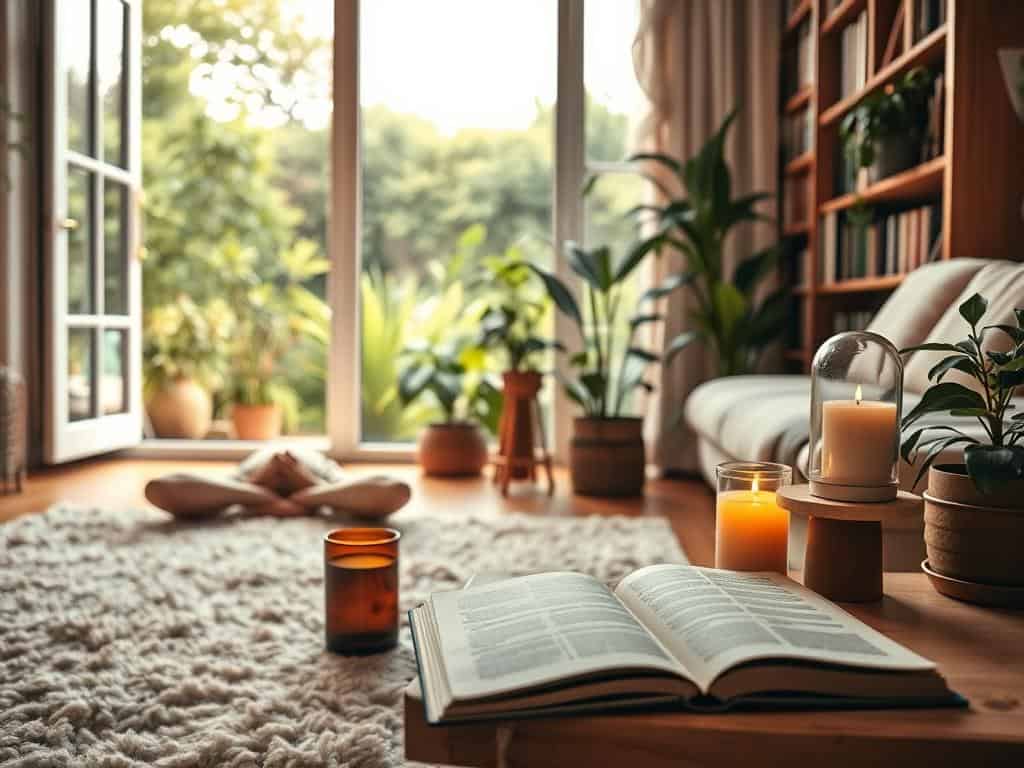In our busy lives, we often crave a moment of calm. Stress used to be my constant shadow, making it hard to find joy. But then, I found the power of self-care. It turned everyday tasks into moments of peace and renewal.
My journey to mental wellness wasn’t just about spa days. It was about building habits that uplift us every day. By focusing on self-care, I learned many ways to reduce stress and feel better.
From yoga to enjoying my favorite songs, these small acts brought peace into my life. Taking time for myself was a way to care for my mind and body. In this article, I’ll share how you can create your own self-care routine for a happier, healthier life.

Key Takeaways
- Engaging in physical touch, like hugs, can significantly reduce stress hormones and elevate mood.
- Practicing gratitude journaling contributes to improved mental health by fostering a positive outlook.
- Connecting with friends enhances emotional well-being and lifts spirits during tough times.
- Creative activities, such as art, can effectively reduce anxiety and lower cortisol levels.
- Simple self-care rituals, such as a quick cold shower, can release endorphins and boost energy.
- Incorporating small daily stretches helps alleviate anxiety and promotes mindfulness.
Understanding the Importance of Self-Care
Self-care is key to feeling good in today’s fast world. It helps avoid burnout, anxiety, and depression. By making time for self-care, I’ve seen a big improvement in my life.
Self-care helps balance my emotions and reduces stress. Studies show it’s good for my mental health and emotional stability.
Benefits of a Daily Self-Care Routine
Having a daily self-care routine has many benefits. It boosts physical and emotional health. It also lowers anxiety and depression, making me happier and more energetic.
For example, exercise is good for my heart and lowers disease risks. Journaling helps me feel better and manage stress. Prioritizing self-care can really change your life.
Identifying Your Personal Self-Care Needs
Finding out what self-care means to me has been a journey. Everyone’s needs are different, based on their genes, personality, and support. It’s important to know what self-care looks like for me.
It might be exercise, hobbies, or staying connected with friends. Knowing what I need helps me create a self-care plan that works for me.
Daily Self-Care Routine: Steps to Implement
Creating a daily self-care routine can greatly improve your well-being. It’s key to balance your life with self-care activities. These steps will help you add practices that boost your mental and physical health.
Incorporating Mindfulness Practices
Mindfulness practices are great for clear thinking and emotional balance. Activities like deep breathing or meditation help manage stress. Journaling is also helpful, letting you reflect on your thoughts and feelings.
By taking a few quiet moments each day, you can feel calmer and less anxious.
Physical Activities for Stress Relief
Physical activities are vital for my self-care. Doing yoga or stretching lowers stress and boosts mood. Even short aerobic exercises can help.
Setting aside time for exercise keeps me mentally sharp and physically healthy.
Healthy Eating for Mental Wellness
What you eat affects your mental health. I focus on whole foods and avoid processed ones. This gives me lasting energy and emotional stability.
Eating balanced meals with fruits, veggies, and proteins improves my mental clarity. Combining healthy eating with self-care creates a strong routine.
Practical Relaxation Tips to Enhance Your Routine
Adding relaxation tips to my self-care routine has boosted my mental health. Being in nature, being creative, and connecting with friends are key. They help me manage stress and feel better overall.
Engaging with Nature
Being outside has a calming effect on me. Studies show that nature can lower stress and bring peace. Just a short walk or sitting in a park can help my heart rate and blood pressure.
These activities also improve my sleep. They make me want to spend more time outside.
Creative Outlets for Reducing Anxiety
Doing creative things helps me express myself. Whether it’s painting, crafting, or writing, it fights anxiety. Research shows these activities make me feel better and more relaxed.
They let me focus on the moment and enjoy the present. This boosts my mood and joy.
Building Strong Social Connections
Having strong relationships is vital for my mental health. Friends and family offer support and fight loneliness. Sharing moments with them creates happy memories.
I make sure to keep these connections strong. They make me feel valued and support my self-care.
Conclusion
A daily self-care routine is key to a stress-free life and better mental health. I’ve learned that self-care is vital. It helps me meet my personal needs and take steps for my well-being.
Creating a routine takes time and effort, but it’s worth it. Studies show it can take 18 to 254 days to form a routine. This shows we all have different paths to habit formation.
Even if I slip up, it doesn’t stop my progress. This shows self-care is a journey, not just a goal. It’s about growing and improving over time.
Self-care is essential for dealing with life’s challenges. It helps me manage stress and build emotional strength. By following my routine, I not only improve my own well-being but also help others.
As I keep practicing self-care, I see it as a must, not a luxury. It’s a fundamental part of living a healthy life.
